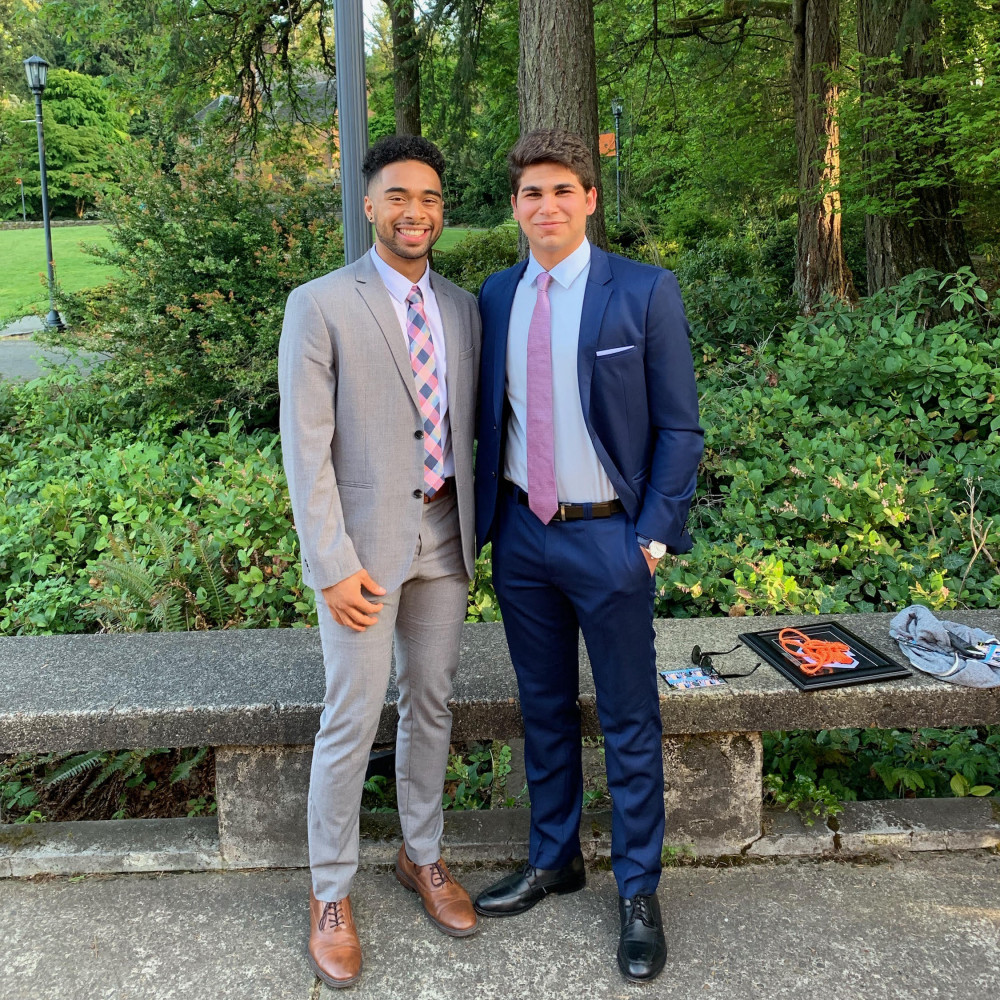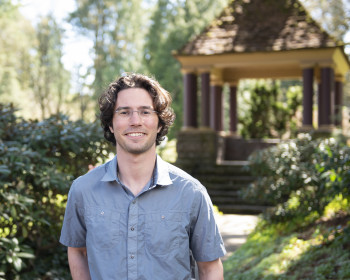Students Win Big at the Invent Oregon Collegiate Competition

“The feeling is unbelievable,” Brown says of the wins. “This was a huge milestone for us, but we’re definitely still looking at this as a long-term project.”
Both Brown, an international affairs major from Rancho Cucamonga, California, and Attia, an economics and psychology double major from Cairo, Egypt, will graduate in May with the newly approved entrepreneurial leadership and innovation minor.
They describe their meeting as something of a cosmic accident. Brown transferred to Lewis & Clark as a sophomore, seeking out a balance between a competitive men’s basketball team and an academically rigorous environment. Attia, a member of the men’s tennis team, was considering transferring out of Lewis & Clark his first year before he discovered the Bates Center for Entrepreneurship and participated in his first Winterim. The two happened to be assigned to the same living suite and quickly bonded over a passion for business and entrepreneurship.
“Lewis & Clark has a lot of resources, but you have to find them,” Brown says. “Being at a small school plays in our favor. You’re able to build closer relationships than you would if you were in a bigger school with thousands of kids.”
Brown and Attia cite the mentorship of Associate Director of the Bates Center Chrys Hutchings and Associate Director of Operations Catarina Hunter as an essential part of their education and development as entrepreneurs, as well as their time as copresidents of the Entrepreneurship Club.
Before last year’s Winterim pitch competition, Brown and Attia began tossing around the idea of a new invention. They saw a gap in the market for a preventative tool for drunk driving, a problem that leads to almost 30 deaths per day in the U.S. There are hand-held breathalyzers that can test your blood alcohol level, but they can’t stop you from getting in the car. There are state-mandated interlock systems that can be installed, but that is only after you have been pulled over for a DUI.
Brown and Attia came up with SafeStart, a new device that sidesteps these shortcomings by communicating directly with the car’s ignition. If a driver fails SafeStart’s handheld breathalyzer test, the ignition is disabled.
“We’re trying to get away from the stigma of breathalyzers,” Attia says. “We’re not telling you not to drink, and we’re not even projecting your blood alcohol level. We’re just letting you know whether or not you’re safe to drive.”
Attia presented their idea at last January’s Winterim and the pair qualified for the Invent Oregon competition. At first, the state-wide competition seemed like an almost impossible task––both students were in-season athletes and working part-time jobs on top of school––but the outbreak of COVID-19 offered a rare opportunity to fine-tune their proof of concept for an additional six months.
On opposite ends of the California coast, Brown and Attia collaborated through video calls and messages, interviewing hundreds of families to conduct early-stage market research. Over the summer, the Bates Center introduced them to Adjacent Academies, a month-long intensive tech program where they were referred to two Amazon engineers based out of Seattle. The engineers, seeing potential in the idea, helped to create the first working prototype.
Advancing to the Invent Oregon finals in September, the last step of the process was a five-minute pitch and a five-minute question and answer session with a panel of 25 judges. Brown and Attia were selected to present first, ahead of 17 other teams from schools including the University of Oregon, Oregon State University, Portland State University, and Oregon Health & Science University.
After winning the competition and earning the top prize, Brown and Attia emphasize that they see SafeStart as a start-up, rather than a product built for a competition. They are now at work on their second prototype, which will include an app that can be controlled by parents, a “best friends list” to be called if the driver fails the breathalyzer test, and facial recognition software to ensure that the driver is taking the test without a false positive.
“We made a pact that even if we didn’t win anything at Invent Oregon, we would see this through,” Attia says. “This is a very serious problem that no one has fixed. We feel like we have a responsibility to see it through now that we invented something that will make a difference in people’s lives.”
More Newsroom Stories
Public Relations is located in McAfee on the Undergraduate Campus.
MSC: 19
email public@lclark.edu
voice 503-768-7970
Public Relations
Lewis & Clark
615 S. Palatine Hill Road MSC 19
Portland OR 97219

